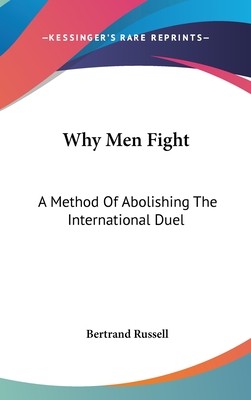
- We will send in 10–14 business days.
- Author: Bertrand Russell
- Publisher: Kessinger Publishing
- ISBN-10: 0548332169
- ISBN-13: 9780548332160
- Format: 15.2 x 22.9 x 1.9 cm, kieti viršeliai
- Language: English
- SAVE -10% with code: EXTRA
Reviews
Description
Also published under the title of Principals of Social Reconstruction, and written in response to the devastation of World War I, "Why Men Fight" lays out Bertrand Russell's ideas on war, pacifism, reason, impulse, and personal liberty. Russell argues that when individuals live passionately, they will have no desire for war or killing. Conversely, excessive restraint or reason causes us to live unnaturally and with hostility toward those who are unlike ourselves.
Excerpt:
To one who stands outside the cycle of beliefs and passions which make the war seem neces sary, an isolation, an almost unbearable separa tion from the general activity, becomes unavoid able. At the very moment when the universal disaster raises compassion in the highest de gree, compassion itself compels aloofness from the impulse to self-destruction which has swept over Europe. The helpless longing to save men from the ruin towards which they are hastening makes it necessary to oppose the stream, to in cur hostility, to be thought unfeeling, to lose for the moment the power Of winning belief. It is impossible to prevent others from feeling hos tile, but it is possible to avoid any reciprocal hos tility on one's own part, by Imaginative under standing and the sympathy which grows out Of it. And without understanding and sympathy it is impossible to find a cure for the evil from which the world Is suffering.
EXTRA 10 % discount with code: EXTRA
The promotion ends in 23d.10:09:10
The discount code is valid when purchasing from 10 €. Discounts do not stack.
- Author: Bertrand Russell
- Publisher: Kessinger Publishing
- ISBN-10: 0548332169
- ISBN-13: 9780548332160
- Format: 15.2 x 22.9 x 1.9 cm, kieti viršeliai
- Language: English English
Also published under the title of Principals of Social Reconstruction, and written in response to the devastation of World War I, "Why Men Fight" lays out Bertrand Russell's ideas on war, pacifism, reason, impulse, and personal liberty. Russell argues that when individuals live passionately, they will have no desire for war or killing. Conversely, excessive restraint or reason causes us to live unnaturally and with hostility toward those who are unlike ourselves.
Excerpt:
To one who stands outside the cycle of beliefs and passions which make the war seem neces sary, an isolation, an almost unbearable separa tion from the general activity, becomes unavoid able. At the very moment when the universal disaster raises compassion in the highest de gree, compassion itself compels aloofness from the impulse to self-destruction which has swept over Europe. The helpless longing to save men from the ruin towards which they are hastening makes it necessary to oppose the stream, to in cur hostility, to be thought unfeeling, to lose for the moment the power Of winning belief. It is impossible to prevent others from feeling hos tile, but it is possible to avoid any reciprocal hos tility on one's own part, by Imaginative under standing and the sympathy which grows out Of it. And without understanding and sympathy it is impossible to find a cure for the evil from which the world Is suffering.


Reviews